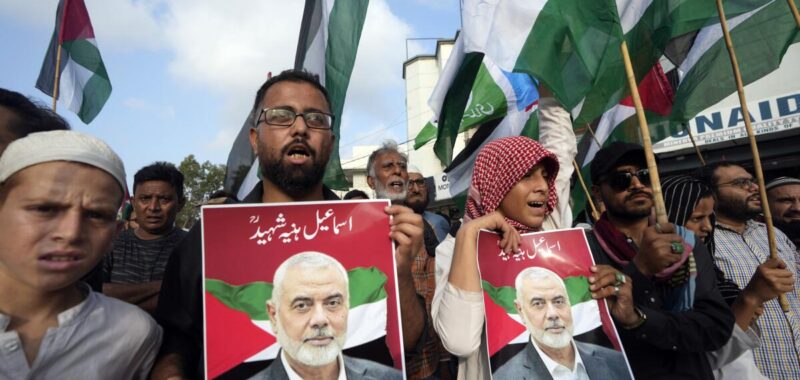The killing Wednesday of top Hamas leader Ismail Haniyeh will likely derail urgent U.S.-led talks to stop the fighting in Gaza and open the door to a potentially ferocious response from Iran.
In a strike widely blamed on Israel, Haniyeh was killed in an airstrike while in Tehran for the inauguration of the Iranian president. Israel has not claimed responsibility, but few entities have the military capability to pull off what was apparently a precisely targeted lethal attack.
The timing of the assassination frustrated the Biden administration, which has invested enormous capital in cease-fire talks to bring at least a temporary end to the nearly 10-month-old Gaza war.
Israeli Prime Minister Benjamin Netanyahu was in Washington just last week. Both President Biden and Vice President Kamala Harris separately hammered him on the vital importance of agreeing to a cease-fire.
For months, the U.S., Qatar and Egypt have been engaged in tense and arduous negotiations with Israel and Hamas on a deal that would stop fighting and release Israeli hostages still being held by Hamas.
The hostages were captured in the Oct. 7 Hamas attacks in southern Israel that killed nearly 1,200 Israelis and triggered the current conflict. Nearly 40,000 Palestinians have been killed in Israel’s brutal subsequent invasion of Gaza, spurring a massive humanitarian crisis as well.
Haniyeh, who was based in exile in Qatar and headed the political wing of the militant group, was key in the cease-fire negotiations.
He was the Hamas figure who would sit with Qatari negotiators to receive the latest proposals and counter-proposals from Israel, then relay them to the ultimate decision-maker Yahya Sinwar, head of the Hamas military wing and believed to be in hiding in deep tunnels underneath the Gaza Strip. Then Haniyeh would relay Sinwar’s response back to negotiators.
Both the Israeli side and Hamas have repeatedly put obstacles to impede a final agreement, negotiators say.
U.S. officials Wednesday were urgently trying to prevent talks from breaking down altogether now. Though a short-term suspension seems all but certain, U.S. officials said they believe talks will eventually resume, especially because there are other lower-level leaders in Hamas who want a cease-fire despite Sinwar’s resistance.
Secretary of State Antony J. Blinken spent much of the day in brief but pointed phone calls with Arab allies, particularly the Qataris, in an effort to get talks back on track. The Qataris have not yet threatened to end their mediation role, but voiced displeasure with Haniyeh’s killing.
“Political assassinations & continued targeting of civilians in Gaza while talks continue leads us to ask, how can mediation succeed when one party assassinates the negotiator on the other side?” Qatar’s prime and foreign minister Mohammed bin Abdulrahmin al Thani said on X, formerly Twitter. “Peace needs serious partners & a global stance against the disregard for human life.”
Blinken said the U.S. had no role or advance knowledge of the assassination.
Netanyahu has long vowed to wipe out Hamas.
“Israel is trying to show its own people that it’s open season on Hamas leaders,” said Daniel Byman, a veteran researcher on the Middle East and senior fellow at the Center for Strategic and International Studies. “Pointing to killed of senior people is one way to say ‘we are winning.’”
But experts say “winning” against Hamas is an elusive goal. And Hamas leaders quickly said Wednesday that no killings will stop its fight for Palestinian liberation.
“Hamas is an idea, and the martyrdom of its leaders does not stop this idea,” Hamas official Sami Abu Zuhri told the Al-Aqsa news channel.
Further exacerbating regional tensions was Israel’s drone strike Tuesday on a high-ranking Hezbollah commander in a residential building in Beirut, killing four people — including two children — and wounding 74, Lebanese officials said.
The widening cross-border violence heightened fears that the Gaza conflict will ignite a broader Mideast war.

